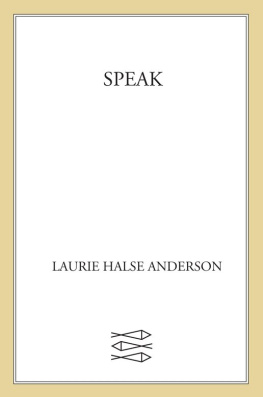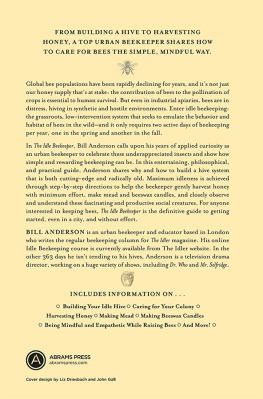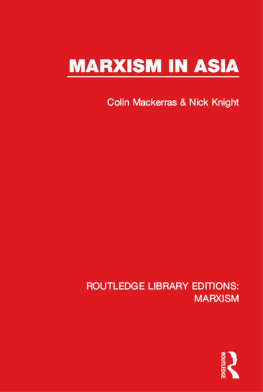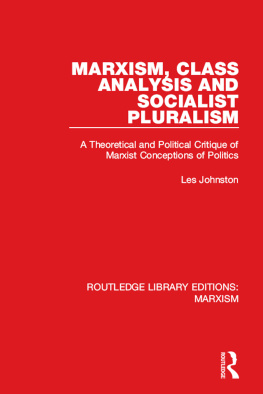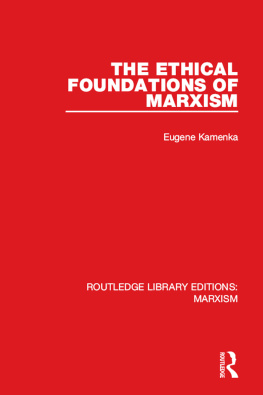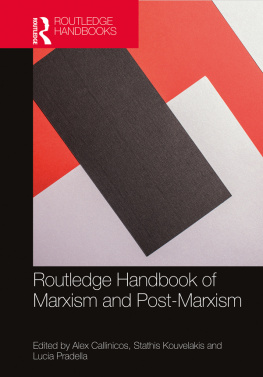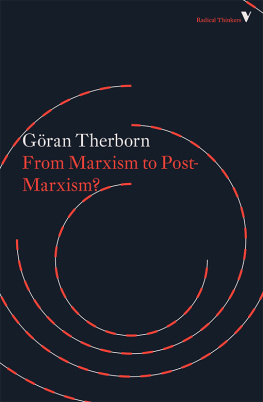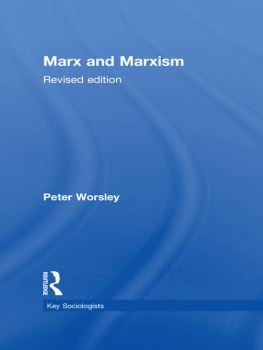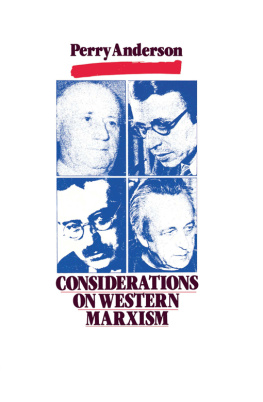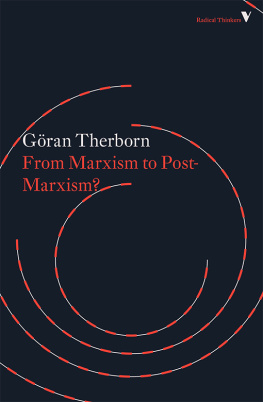Anderson - Arguments Within English Marxism
Here you can read online Anderson - Arguments Within English Marxism full text of the book (entire story) in english for free. Download pdf and epub, get meaning, cover and reviews about this ebook. City: London, year: 1980, publisher: Penguin Random House LLC (Publisher Services);Verso, genre: Politics. Description of the work, (preface) as well as reviews are available. Best literature library LitArk.com created for fans of good reading and offers a wide selection of genres:
Romance novel
Science fiction
Adventure
Detective
Science
History
Home and family
Prose
Art
Politics
Computer
Non-fiction
Religion
Business
Children
Humor
Choose a favorite category and find really read worthwhile books. Enjoy immersion in the world of imagination, feel the emotions of the characters or learn something new for yourself, make an fascinating discovery.
Arguments Within English Marxism: summary, description and annotation
We offer to read an annotation, description, summary or preface (depends on what the author of the book "Arguments Within English Marxism" wrote himself). If you haven't found the necessary information about the book — write in the comments, we will try to find it.
Arguments Within English Marxism — read online for free the complete book (whole text) full work
Below is the text of the book, divided by pages. System saving the place of the last page read, allows you to conveniently read the book "Arguments Within English Marxism" online for free, without having to search again every time where you left off. Put a bookmark, and you can go to the page where you finished reading at any time.
Font size:
Interval:
Bookmark:

The characteristic form taken by English Marxism since the war has been study of history. No writer exemplifies its achievements better than Edward Thompson, whose Making of the English Working Class is probably the most influential single work of historical scholarship by a socialist today. An editor of The New Reasoner in 1957-1959, a founder of the New Left in 1960, now an eloquent champion of civil rights, Thompson has most recently aroused widespread interest with the appearance of his Poverty of Theory, which combines philosophical and political polemic with Louis Althusser, and powerful advocacy of the historians craft. Arguments Within English Marxism is an assessment of its central theses that relates them to Thompsons major historical writings themselves. Thus the role of human agencythe part of conscious choice and active willin history is discussed through consideration of its treatment in The Making of the English Working Class. The problems of base and superstructure in historical materialism, and of affiliation to values in the past, are reviewed in the light of Whigs and Hunters. The claims of utopian imagination are illustrated from the findings of William Morris. Questions of socialist strategy are broached in part through the articles now collected in Writing by Candlelight. Exploring at once differences and convergences between New Left Review and one of its founders, the essay concludes by suggesting the virtues of diversity within a common socialist culture.

Verso
English Marxism
British Library
Cataloguing in Publication Data
Anderson, Perry
Arguments Within English Marxism.
1. Thompson, Edward Palmer
I. Title
907 .2024 D15.T5/
Perry Anderson, 1980
Verso
UK: 6 Meard Street, London W1F 0EG
US: 20 Jay Street, Suite 1010, Brooklyn, NY 11201
www.versobooks.com
ISBN-13: 978-0-8609-1727-4 (PB)
ISBN-13: 978-1-78478-793-6 (US EBK)
ISBN-13: 9781-7-8478-792-9 (UK EBK)
The historian may tend to be a bit too generous because a historian has to learn to attend and listen to very disparate groups of people and try and understand their value-systems and their consciousness. Obviously in a very committed situation you cant always afford that kind of generosity. But if you afford it too little then you are impelled into the kind of sectarian position in which you are repeatedly making errors of judgement in your relations with other people. We have seen a lot of that recently. Historical consciousness ought to assist one to understand the possibilities of transformation and the possibilities within people.
EDWARD THOMPSON
future that has surpassed the problem of leisure. Each of these texts has been in its own way a militant intervention in the present, as well as a professional recovery of the past. The massive consistency of their direction, from the mid 50s to the late 70s, visibly attested in the long Postscript to the new edition of the study of Morris (1977) is profoundly impressive. At the same time, these works of history have also been deliberate and focused contributions to theory: no other Marxist historian has taken such pains to confront and explore, without insinuation or circumlocution, difficult conceptual questions in the pursuit of their research. The definitions of class and class consciousness in The Making of the English Working Class; the critique of base and superstructure through the prism of law in Whigs and Hunters; the reinstatement as disciplined imagination of utopianism in the new edition of William Morrisall these represent theoretical arguments that are not mere enclaves within the respective historical discourses, but form rather their natural culmination and resolution.
The claim on our critical respect and gratitude, then, is one of formidable magnitude and complexity. Some appraisal of Thompsons central ideas and concerns is, however, long overdue. The publication of The Poverty of Theory provides an occasion to begin such an assessment.
Past and Present, No 38, 1967, pp. 56-97.
London, 1978.
References to the latter will henceforward be abbreviated to PT; The Making of the English Working Class (Penguin edition: 1963) to MEWC; Whigs and Hunters (1973) to WH; William MorrisRomantic to Revolutionary (1977 re-edition) to WM.
See the remarks in Considerations on Western Marxism, London 1976, pp. 111-112.
The opening sections of The Poverty of Theory are addressed to certain general issues of historiography as a discipline. Three distinct problems are explored by Thompson, which can be formulated as follows: (i) what is the particular nature and place of evidence in any historical inquiry? (ii) what are the appropriate concepts for the understanding of historical processes? (iii) what is the distinctive object of historical knowledge? In each case, Thompson evokes and rejects what he takes to be Althussers answer, and proposes his own solution. He begins his case with the charge that Althussers epistemology exhibits a radical indifference towards the primary data which make up what it terms Generalities I: no explanation or attention is ever given to either the character of these data, or their originschief among which is experience. Althussers cavalier attitude towards empirical facts is confirmed by his account of Generalities II, or the process of cognition itself, which in effect assumes that any scientific theory can define and produce its own facts by self-validating protocols, without recourse to external appeals. Thompson argues that this is an abusive extension of the very limited and exceptional procedures of mathematics or logic, that is wholly illegitimate if applied to either the social or physical sciences, where the controls of evidence are always central. The result is that no genuine new knowledge can emerge in Althussers Generalities III (its ostensible site), since Generalities II has already pre-packaged the data of Generalities I
What is the justice of these charges? In my view, a great deal. Althussers theory of knowledgeboth of science and of ideologyis, as I have argued elsewhere, directly tributary to that of Spinoza. for their dictum that facts are never given, they are always produced, but fails to note that the work from which he quotes precisely attacks Althusser for empiricism, and hence can scarcely be regarded as a stand-in for the latter.
In constructing an eloquent and necessary general defence of the historians craft, Thompson in effect too often proceeds to an amalgamation of individual positions, each of them deficient, but in significantly different degrees and ways. Thus Althusser does indeed reply improperly on logico-mathematical protocols of proof as models of scientific procedure. His theory of knowledge, dissociated from the controls of evidence, is untenably internalist: above all, it lacks any concept of falsification. Vice versa, however, the strength of Poppers philosophy of scienceone is not sure whether Thompson realizes how strong it ishas always lain precisely in its insistence on falsifiability, a principle crucially qualified by Lakatos and others, but uncompromised by Poppers egregious illusions about historical records. The hostility which Thompson senses in the two philosophers to the practice of the historian has opposite originsapproximately, over-confidence in the paradigms of mathematics and of physics respectively; and opposite outcomesdenial of any laws of motion in the random course of history, and affirmation of them in the implacable machinery of the
Font size:
Interval:
Bookmark:
Similar books «Arguments Within English Marxism»
Look at similar books to Arguments Within English Marxism. We have selected literature similar in name and meaning in the hope of providing readers with more options to find new, interesting, not yet read works.
Discussion, reviews of the book Arguments Within English Marxism and just readers' own opinions. Leave your comments, write what you think about the work, its meaning or the main characters. Specify what exactly you liked and what you didn't like, and why you think so.





